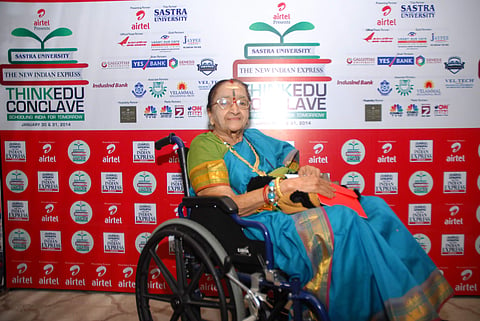

Educationist and Padma Shri recipient Rajalakshmi Parthasarathy, popularly known as Mrs YGP, who was the moving force behind the Padma Seshadri Bala Bhavan (PSBB) group of schools, had a cardiac arrest and passed away at Apollo Hospital in Greams Road on Tuesday. Her body is now at Bharat Kalachar in TNagar and will be cremated tomorrow at 4 pm in Besant Nagar.
The well-known educationist was awarded the Padma Shri in 2010 and she has been highly appreciated for her contributions to the CBSE syllabus. The concept of continuous assessment — as opposed to an annual exam being the sole determinant — was practised in the schools Rajalakshmi founded much before the CBSE implemented it recently.
Mrs YGP or Rajamma as she was fondly known had always been a rebel. When, as a youngster, she got the opportunity to meet the Father of the Nation Mahatma Gandhi, she cross-questioned him. "I was introduced to him and he sarcastically asked me, ‘Do you know Hindi?’ and so I asked him back, ‘Do you know Tamil?’" Everybody had been shocked, but the Mahatma wasn’t. "He just laughed it off," she had recalled while speaking to The Hindu, "He didn’t get offended that I had defied him."
It was this everlasting rebellious streak that made her set up a school — Padma Seshadri Bala Bhavan, in Nungambakkam. "We were imitating the Anglo-Indian system of education blindly," she had said in one of her interviews. "We were forbidden from asking ‘Why not?’ Also, from following the system of study from the British period, we had lost all respect for our culture. We spoke indifferently and had a very low opinion about it. I was determined to do something about it." What was of utmost importance to her was teaching Indian art and culture and making it a part of our child's education across the country.
The first-ever school she set up — with friends from her Ladies Club as teachers and her own kid and his friends as students — has through the years dropped roots in different parts of Chennai. Her dream institution would be a 'break-away school, her answer to the irony of Indians abandoning their pre-independence nationalism for westernisation' and it was nothing save her resolve that made it possible. The school would retain English as the medium but the message would strongly reflect Indian mythology, Vedic scriptures, traditions and values. "Our lack of pride in our rich heritage, she surmised, was born out of our lack of knowledge about it," she had said.
People ridiculed her calling the institutions a cultural centre rather than a school, but she didn't back down. She was the agent of change, with her school as the model — the PSBB (Padma Seshadri Bala Bhavan) model. Step-by-step she upgraded the system, incorporating the best practices from schools she visited abroad. Punishment for the children studying in these schools is (and was) spending time in the library, forgoing favourite classes — a blueprint that she created to abolish corporal punishment. And what that resulted in was commendable. PSBB students went abroad, became ambassadors of our cultural traditions and more and more parents wanted to put their kids in the schools. In order to consolidate cultural activities, Rajalakshmi also started Bharat Kalachar, an in-house centre that offers scholarships to kids brilliant in the arts, gives young artists a break, invites senior artists to perform.
Her success reflected in the fact that her students say, "Shri Gurubyo Namaha", instead of the routine "good morning" greeting.
